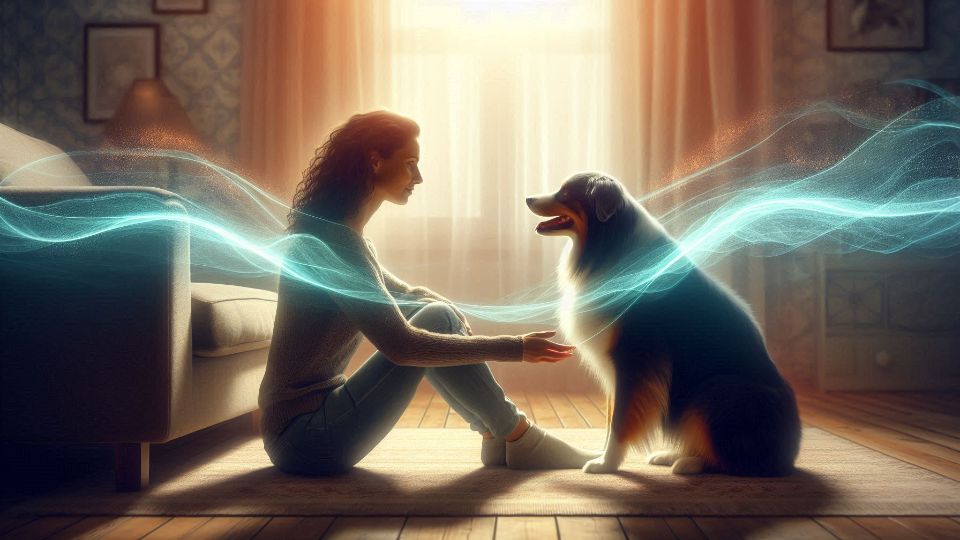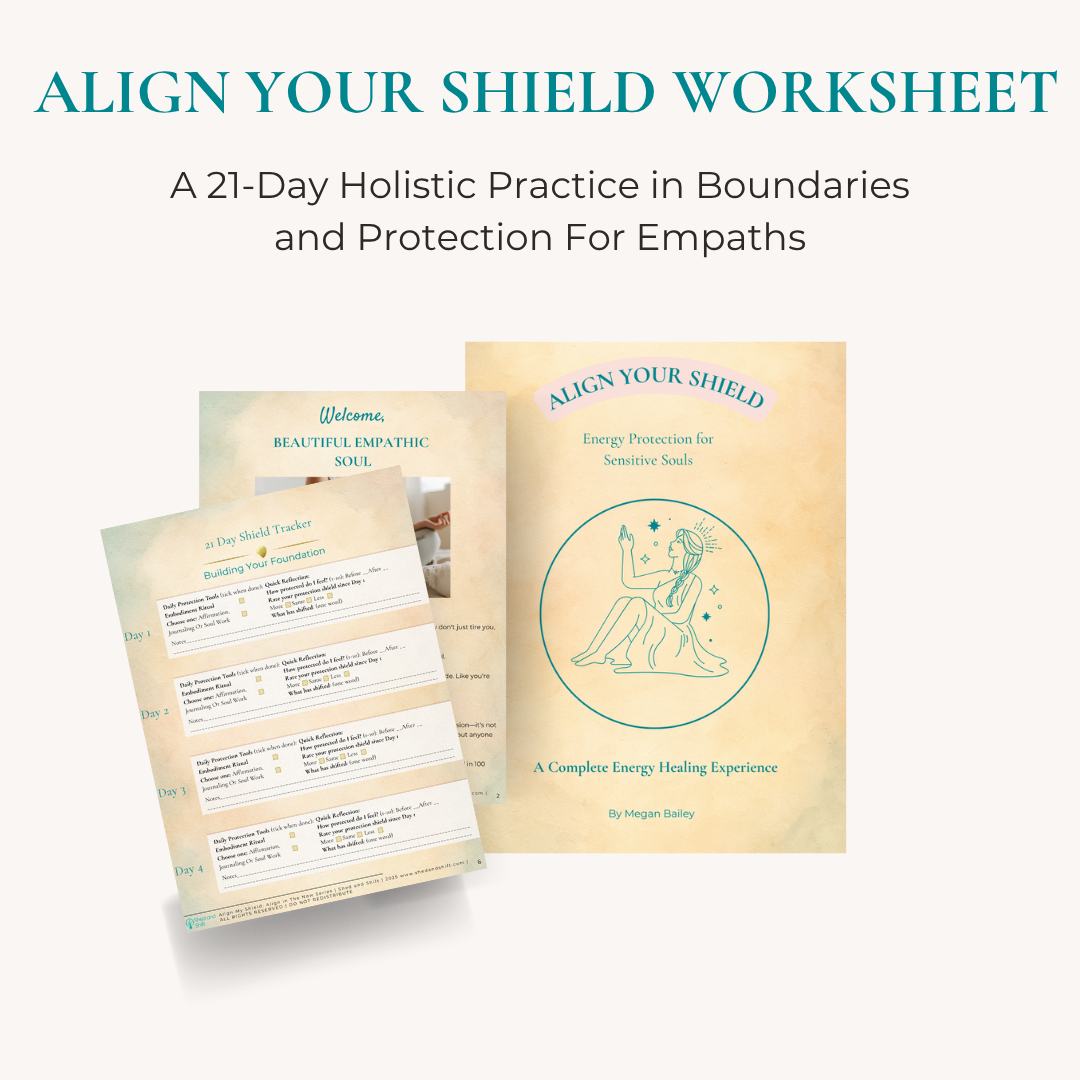Mind Activation
Why Your Past Makes You Absorb Everyone's Emotions
The Empath's Journey
Part 1 of 8: Foundation & Past Influences (to be continued...)

Why Am I So Sensitive? The Truth You Need To Hear
Part 1 of 8: Understanding Where You Are and How You Got Here
You’ve probably heard it your whole life. “You’re too sensitive.” “You overthink everything.” “Why do you let things bother you so much?”
Maybe you’ve even started to believe something’s wrong with you. That you feel too much. Care too much. Take on too much. Maybe you’ve spent years trying to toughen up, to care less, to feel less deeply. Trying to be more like everyone else who seems to move through life without carrying the weight you carry.
But what if the real problem isn’t that you feel too much? What if it’s simply that no one ever explained what’s actually happening when you feel this way? What if there’s nothing wrong with you at all—and instead, you’re experiencing something real, something valid, something that makes perfect sense once you understand it?
If this resonates with you, there’s a reason. You’re an empath. And you’re standing at the beginning of a journey—one that will take you from confusion to clarity, from overwhelm to understanding, from merely surviving to actually thriving.
This article is Part 1 of that journey. And it starts with the most important question: where are you right now, and how did you get here?
Why Am I So Sensitive? The Confusion You’ve Been Living In
Let me describe where you probably are right now.
You’re confused. Deeply confused. About what you feel. About why you feel it. About whether what you’re experiencing is even real.
You walk through your days carrying a weight you can’t name. Feeling things you can’t explain. Exhausted by interactions that seem to energize everyone else. Drained by environments that others find perfectly manageable.
And you keep asking yourself the same questions: Why am I like this? What’s wrong with me? Why is everything so hard?
You watch other people move through life with an ease you can’t comprehend. They have difficult conversations and shake them off. They navigate conflict without carrying it home. They attend social gatherings and leave feeling energized rather than depleted. They set boundaries without experiencing guilt.
And you wonder: Why can’t I do that? Why does everything affect me so deeply? Why do I feel so different from everyone around me?
This confusion isn’t just frustrating. It’s unsettling. Because when you don’t understand what you’re experiencing, you can’t make sense of your own life. You can’t trust your reactions. You can’t explain yourself to others. You start to believe that maybe everyone else is right—maybe you are just too sensitive, too emotional, too much.
But here’s the truth: This is where your journey begins. In this confusion. In this place of not understanding what’s happening to you or why you’re experiencing life so differently from those around you. And understanding changes everything.
Am I An Empath? The Moment of Recognition
But something is shifting. Maybe that’s why you’re reading this right now.
Maybe you’ve started to suspect that what you’re experiencing isn’t a character flaw. That your sensitivity isn’t a weakness to overcome. That there might be a reason—a valid, real reason—for why you feel the way you do.
Maybe you’ve come across the word “empath” before and felt something click into place. A recognition. A sense of finally having a word for what you’ve always experienced but never knew how to name.
Or maybe you’re reading this and experiencing that recognition right now. That feeling of “oh my god, this is me. This is what I’ve been trying to explain my entire life.”
This moment of recognition is crucial. Because you can’t begin a journey until you know where you’re starting from. You can’t heal what you don’t first acknowledge. You can’t develop tools for something you don’t yet understand.
So let’s start by clearly naming what you are: You’re an empath. And that means your experience of the world is fundamentally different from most people around you in ways that are real, valid, and have nothing to do with weakness or failure.
How Empaths Absorb Emotions: What Being an Empath Actually Means
Let me be very clear about what’s happening to you.
You’re not just noticing that your friend seems sad. You’re not just observing her sadness from the outside, the way most people do. You’re feeling that sadness in your own body. As if it were your own. As if her pain has become your pain.
You’re not simply aware that your coworker is stressed. You’re not just mentally noting “oh, they seem tense today.” You’re carrying that stress home with you. It settles into your shoulders like a physical weight. It clouds your mind. It follows you through your evening, into your sleep, sometimes into the next day.
This isn’t metaphor. This isn’t exaggeration. This is what actually happens to you.
Your nervous system processes emotional and energetic information that most people’s nervous systems filter out. While others walk through the world experiencing primarily their own emotional state, you’re picking up on frequencies they don’t even know exist.
Think of it like this: you have a radio that picks up frequencies others can’t detect. Those frequencies are always broadcasting. Always there. Always demanding your attention. You can’t just turn the radio off. You can’t decide not to hear it. It’s always on, always receiving, always processing.
And here’s what makes this so challenging: nobody taught you that you had this radio. Nobody explained that you were picking up all these extra signals. Nobody gave you tools for managing the constant influx of information your system processes every single moment of every single day.
So you’ve been walking through life confused about why you’re so overwhelmed. Why simple interactions leave you exhausted. Why being around people drains you in ways you can’t explain. Why you feel so different from everyone else.
The answer isn’t that something’s wrong with you. The answer is that you’re doing invisible work that others aren’t doing. You’re processing emotional data that others don’t even perceive. And nobody ever acknowledged that this work exists, let alone helped you learn how to do it in a way that honors your energy.
Empath Childhood Trauma: How You Became This Way
Now let’s talk about how you got here. Because understanding your origin story is essential to understanding where you are now.
You weren’t born broken. You weren’t born flawed. But something shaped you into the empath you are today—and understanding that can help you move forward with more clarity.
When You Were Born This Way
Here’s something important: Many empaths were simply born this way. Your empathic nature is your natural wiring. It’s not a wound. It’s not a defense mechanism. It’s just who you are.
Maybe you grew up in a loving, stable family. Parents who were emotionally available. A home where feelings were welcomed and processed healthily. And yet you were still the child who felt everything deeply. Who sensed what others were feeling. Who absorbed the emotional temperature of every room you walked into.
In families like this, your empathic nature might have been recognized and nurtured. Your parents might have helped you understand your sensitivity as a gift. Taught you that it was okay to feel deeply. Gave you tools to manage the natural intensity that comes with feeling so much.
Or maybe your family didn’t quite know what to do with your sensitivity, but they didn’t shame you for it either. They accepted that you were different. That you needed more downtime. That certain situations overwhelmed you. And they did their best to support you even if they didn’t fully understand.
If this is your story, you might not carry deep wounds around worthiness and value. Your challenge isn’t healing a broken foundation—it’s learning to navigate a world that isn’t designed for people who feel as deeply as you do. And that’s a journey of learning and adaptation, not healing trauma.
The Childhood Origins
For other empaths, this sensitivity begins in childhood environments where emotional expression was complicated. Where feelings were big but unprocessed. Where you learned very early that your role was to manage the emotional temperature of your household.
Maybe you grew up with a parent who was overwhelmed—anxious, depressed, emotionally struggling. And you, even as a small child, became attuned to their moods. You learned to read the emotional climate of your home before you even walked in the door. You developed the ability to sense when your mother was having a difficult day or when your father’s mood was shifting. Not because you wanted to. But because understanding helped you feel safe.
Children in emotionally challenging environments often develop heightened sensitivity as a way to navigate. If you can sense the emotional shifts before they happen, you can adjust. You can offer support. You can make yourself helpful. And this sensitivity, developed early, became wired into your nervous system.
Or maybe you grew up in a family where emotions were suppressed entirely. Where feelings were ignored or dismissed. Where you learned that the way to be loved was to not have needs, to not cause problems, to manage your own emotions so as not to burden anyone else.
In families like this, empathic children often become the emotional containers for everyone else’s unexpressed feelings. Your mother couldn’t express her grief, so you felt it for her. Your father couldn’t acknowledge his concerns, so they lived in your body instead. Your siblings’ pain had nowhere to go, so you absorbed it.
This wasn’t a conscious choice. This is what empathic children do in emotionally repressed environments. They become the repository for all the feelings that can’t be safely expressed. And they carry that weight, often for decades, without understanding what they’re carrying or why it feels so heavy.
When Difficult Experiences Created Hypervigilance
Or perhaps you experienced difficult life events—loss, instability, experiences that felt unsafe—and your system developed heightened sensitivity as a way to try to predict and prevent future difficulty. If you can sense challenges before they arrive, maybe you can protect yourself. Maybe you can prepare better next time.
Challenging experiences can rewire the nervous system. They create a state of heightened awareness where you’re always scanning for emotional cues. Always reading situations. Always trying to stay safe by staying aware. And for many empaths, this experience-based hypervigilance becomes woven together with their natural empathic gifts.
Understanding Your Path
The truth is, empathic ability exists on a spectrum. Some people are born with it as their natural state. Some develop it through life experiences. Some have both—they were born empathic AND their family environment or life experiences intensified that natural sensitivity.
Whatever your path to empathic awareness, the result is the same: You’re navigating life with a nervous system that processes more information than most people’s systems do. And whether that came from nature, life experience, family patterns, or some combination—it’s real. It’s valid. And it requires specific understanding and tools.
For some empaths, these early experiences also taught them that their worth is tied to how much they give, how much they carry, how much they offer. That without this emotional support, they have less value. This belief can become a foundation that needs attention and healing. But not every empath carries this wound—and recognizing whether you do can help you understand what kind of support you need most.
The Weight You’re Carrying Now
Fast forward to today. To right now. To where you are in this moment.
You’re not that child anymore. You’re an adult. You’ve built a life. You have relationships, responsibilities, maybe a career and a family of your own.
But you’re still carrying weight. Still absorbing everyone’s emotions. Still putting everyone else first. Still wondering why everything feels so demanding.
Because it’s not just your family anymore. It’s your partner. Your children. Your friends. Your colleagues. Your clients. Strangers on the street. The collective anxiety of the world coming at you through news and social media.
You’re absorbing emotional content from everyone around you, all day, every day. And you haven’t yet learned how to manage this. How to set boundaries that feel sustainable. How to distinguish your own emotions from the ones you’ve absorbed from others.
You wake up tired. You move through your days feeling foggy. You feel everything intensely and yet somehow feel disconnected from your own life. You’re overwhelmed but can’t explain to anyone what’s actually overwhelming you because most of it is invisible.
This is where you are right now. Carrying weight that was never yours to carry. Confused about why everything feels so challenging. Wondering if you’ll ever feel truly at ease.
And here’s what I need you to understand: This isn’t where you have to stay. Understanding changes everything.
Empath Nervous System: Why You Can’t Just “Get Over It”
Before we go any further, let’s address something important.
You’ve probably tried to fix this already. You’ve probably tried all the usual advice.
“Just set boundaries.” “Just say no.” “Just don’t take things so personally.” “Just focus on yourself for once.”
And none of it worked. Or it worked briefly, and then you fell back into the same patterns. And you felt discouraged for not being able to implement simple advice that works for everyone else.
But here’s the truth: Standard advice doesn’t work for empaths. Because standard advice doesn’t account for the fact that you’re not just dealing with your own discomfort about setting boundaries or saying no.
You’re physically experiencing other people’s emotional reactions in your own body.
When you try to set a boundary, you don’t just feel your own discomfort. You feel their disappointment, their hurt, their confusion, their frustration—as if those emotions were happening to you. Because in a very real sense, they are happening to you. Your system is absorbing and processing their emotional response as if it were your own emotion.
This is why “just set boundaries” doesn’t work as easily for you. Because maintaining a boundary while simultaneously experiencing the other person’s response to that boundary is exponentially more challenging than anyone who isn’t an empath can understand.
This is why you can’t just “get over it” or “toughen up” or “stop caring so much.” Because your empathic nature isn’t a choice. It’s how your nervous system is wired. Telling you to stop absorbing emotions is like telling you to stop hearing sounds or seeing colors.
So if you’ve felt discouraged because you couldn’t make the standard advice work, you can release that right now. You’re not failing. You’re just trying to use tools that weren’t designed for your particular experience.
What you need is a completely different approach. One that accounts for your empathic absorption. One that gives you strategies specifically designed for people whose nervous systems work the way yours does.
And that’s what this journey is about.
The Journey Ahead (Coming Soon)
This is Part 1 of an 8-part journey. And each part will take you deeper into understanding not just what you’re experiencing, but how to move through it toward a life that feels sustainable instead of overwhelming.
In Part 2, we’ll explore your family dynamics—how the patterns you learned in childhood are still playing out in your adult relationships. Why you’re always the one everyone calls. How to recognize the invisible burden of family obligations that’s been affecting your energy for years.
Part 3 will address your workplace reality—why your job exhausts you differently than your colleagues and what’s really happening when you absorb the emotional climate of your entire office.
Part 4 tackles money and abundance—how your empathic nature directly impacts your financial wellbeing and why prosperity can feel elusive despite your best efforts.
Part 5 explores what all of this has done to your physical body—the exhaustion that sleep doesn’t fix, the unexplained symptoms, the physical impact of carrying what was never yours.
Part 6 addresses the mental and cognitive overwhelm—the fog, the confusion, the difficulty making decisions when your mind is processing everyone else’s concerns alongside your own.
Part 7 dives into the spiritual dimension—understanding the difference between emotional empathy and spiritual empathy, and why your spiritual practices might not feel fully supportive right now.
And Part 8 brings it all together—integration, tools, and the path forward toward actually thriving as an empath instead of merely surviving.
But all of that begins here. With recognition. With understanding. With acknowledging where you are and how you got here.
What Changes When You Understand
Understanding your empathic nature doesn’t make the challenges disappear overnight. You won’t read this article and suddenly stop absorbing emotions. You won’t wake up tomorrow and find that everything is easy now.
But understanding changes how you relate to what you’re experiencing. And that changes everything.
When you understand that your overwhelm isn’t a character flaw but a natural consequence of your nervous system processing information others don’t perceive—you can stop blaming yourself.
When you understand that your exhaustion is real, that it’s caused by invisible work nobody acknowledges—you can stop pushing yourself to “just try harder.”
When you understand that the patterns you’re experiencing have roots in how you learned to navigate the world—you can approach them with compassion instead of judgment.
When you understand that you need different tools than what works for non-empaths—you can stop feeling discouraged when standard advice doesn’t help.
This shift from “what’s wrong with me?” to “oh, this is what’s happening” is profound. It’s the difference between shame and understanding. Between confusion and clarity. Between feeling broken and recognizing you’re having a complex but valid experience that makes sense once you understand it.
You’re not too sensitive. You’re not too much. You’re not broken.
You’re an empath. And you’re standing at the beginning of a journey toward understanding, healing, and ultimately thriving with your gifts instead of being limited by them.
This is where we start. With you. With your story. With acknowledgment of where you are and how you got here.
The journey continues in Part 2.
If you’re ready for personalized support as you navigate this journey, book an energy healing session here to work at the energetic level where these patterns are stored.
Hi I am Megan. I’m an empath from South Africa. I found my path as a healer in my 20s—not because I had it figured out, but because I knew deep in my soul I was meant to heal others.
For 15 years, I’ve walked this path—not because it was easy, but because it’s my soul’s calling.
I know what it’s like to absorb everyone’s emotions, to feel too much, to wonder if being this sensitive means something is wrong with you.
Here’s what I discovered: Your empathy isn’t the problem—it’s that nobody taught you how to work WITH your sensitive system instead of against it.
Now I help empaths transform through the trinity of mind, body, and soul healing—because surface fixes don’t work when you feel everything at a cellular level.
This is my life’s work. Empath to empath. Heart to heart.
Get The Lastest Blogs
Keep Reading
You may also like:





